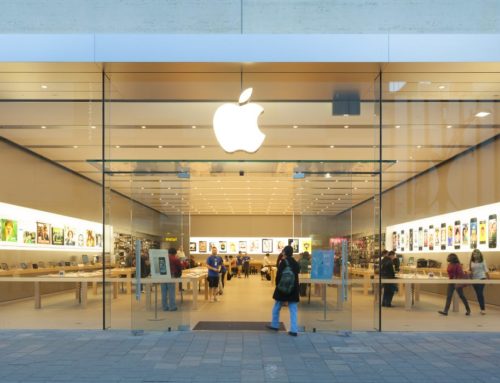Too big not to fail? We assume the biggest companies of today are among the least vulnerable to failure. But the search engines and social media platforms you’re likely using to read this story need to watch out too.
The browser opens with advertisements targeting users based on their internet habits. But unlike most digital platforms, this one pays users 70 percent of what it earns when they interact with an advertisement. Sure, it’s lower than the 100 percent of returns the Facebooks and Googles of the tech world enjoy. But for Brave, the firm behind this browser, it’s a model for how to responsibly use personal information in an era in which consumers are growing increasingly conscious about the privacy — and value — of their data.
For many years, platforms such as Facebook and Google have tracked user data — from browsing history to email addresses — and deployed that to offer companies targeted advertisements. In 2017, Facebook earned $20.21 per user this way, according to filings with the Securities and Exchange Commission — its 1.94 billion monthly active users at the time would have brought in $39 billion in revenue. But none of that money was shared with users. Then there are the violations of data privacy: In April, Facebook confirmed that it’s likely to incur $3 billion to $5 billion in fines from the Federal Trade Commission, potentially for sharing user data without explicit consent.
Now, a host of startups are threatening to challenge that model and force Facebook and Google to adapt — or suffer — with an alternative approach that gives consumers the option to both control their own data and to profit from it. Killi, an app launched by global data company Freckle IoT in 2018 in the U.S. and Canada, lets users decide which pieces of data they want to share with brands in exchange for cash — usually between $3 to $5 per month. Killi is gaining around 10,000 users per month, and it expects to have more than 1 million users by the end of the year, says Freckle IoT founder and CEO Neil Sweeney.
Brave, in prerelease phase at the moment, allows users to opt for a Brave Rewards browser version, where their data will be tracked but stored securely on their browsers — rather than with the company. Users can choose to not interact with targeted advertisements, but if they do, they get 70 cents in cryptocurrency on every dollar Brave earns. Those who don’t opt for Brave Rewards get the regular browser, which is ad-free. The prerelease version has already drawn 5.9 million users and 55,000 publishers.
YOU, AS A CONSUMER, REALLY HAVE NO IDEA HOW MUCH OF YOUR DATA IS BEING COLLECTED.
NEIL SWEENEY, FOUNDER AND CEO, FRECKLE IOTAnd Wibson, a mobile app launched in Argentina, Spain and the U.K. by data platform Grandata in 2018, is a blockchain-powered marketplace where users can sell their data to companies that know they’re getting far more authentic information directly from users than is possible from the algorithms used by big tech firms at present. Users earn $3 to $5 per month in Wibson tokens, a cryptocurrency that runs on the Ethereum blockchain network. Wibson, which is already working with Spanish telecommunications giant Telefónica, has racked up 10,000 users and has facilitated more than 100,000 transactions so far — without storing any user data.
“We see Wibson as a challenge to the current principles and a way for the people who are generating data — the real data owners — to get some benefit,” says Rodrigo Irarrazaval, marketing manager at Wibson.
To be sure, getting billions of Google or Facebook consumers to suddenly switch to Brave, Killi or Wibson is an uphill battle, says Ashley Nelson, who teaches social media and communications at Tulane University. And for now, the amount users can earn through these apps is small — it’ll buy you a snack every month, no more. That’s because these apps can’t yet offer advertisers the volume of data that firms like Facebook and Google promise.
But experts like Nelson as well as the innovators behind these startups are convinced that big tech firms will need to alter their business model or risk losing users and falling afoul of tightening regulations. The EU’s General Data Protection Regulation, which went into effect in May 2018, requires companies to obtain permission from users before giving a third party access to their data. Stricter privacy regulation is also on the anvil in the U.S. In 2018, Gov. Jerry Brown of California, for example, signed the California Consumer Privacy Act (CCPA), which goes into effect in July 2020. The CCPA requires businesses to tell you what data they’ve collected about you and who they’re sharing it with.
These regulatory shifts follow controversies such as the Cambridge Analytica scandal last year, when it was discovered that the British consultancy mined the data of millions of Facebook users for political campaigning without their authorization. Ads are a critical way for companies to track user data, suggests David Temkin, chief product officer at Brave. “Ads are a privacy-invading tactic,” he says. “Third-party sites, without your knowledge, are effectively collecting a dossier on you.” Sweeney agrees. “You, as a consumer, really have no idea how much of your data is being collected,” he says.
At the same time, Temkin understands the value of advertising to both brands and consumers. “We don’t want to destroy the ability to advertise, but we want [ads] to respect users,” he says. Brave, he believes, offers a model for big tech. The demand for data will only grow with the increasing role of artificial intelligence in many industries, says Wibson’s Irarrazaval. That’s why the model these startups are offering is so critical, he says. “Without changes in how things are structured, individuals will not share in that value,” says Irarrazaval. Wibson, currently not available in the U.S., plans to launch in America once the country has better regulations in place.
Apart from monetizing their own data, users are also increasingly looking for trusted platforms to manage their data, suggests Sweeney. “There needs to be an agnostic consent layer that is not Google or Facebook because no one trusts them,” he says. Nelson agrees that trust in big tech is at its lowest point.
Of course, it’s premature to assume that these startups can threaten Facebook or Google. For now, they’re in fact hoping to rely on users’ love for these big firms. “The plan for us in the Killi ecosystem is to offer access to Facebook or Google through Killi,” says Sweeney. It’s also entirely possible that tech giants will adapt to take on the model that these startups have pioneered and continue to expand it. What’s not an option though, these innovators and industry observers say, is the status quo. Big tech will need to change to regain user trust. “The privacy genie is not going back in the bottle,” says Sweeney.
Sourced through Scoop.it from: www.ozy.com







Leave A Comment